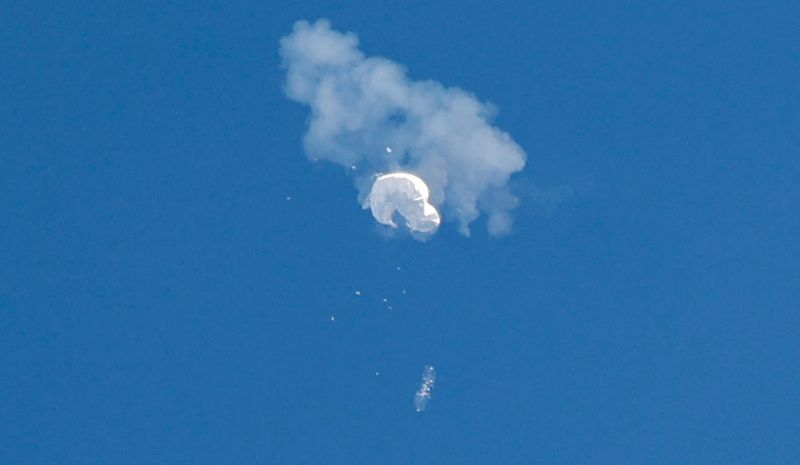By Phil Stewart and Idrees Ali
WASHINGTON (Reuters) - The U.S. military said on Monday it had recovered critical electronics from the suspected Chinese spy balloon downed by a U.S. fighter jet off South Carolina's coast on Feb. 4, including key sensors presumably used for intelligence gathering.
"Crews have been able to recover significant debris from the site, including all of the priority sensor and electronics pieces identified as well as large sections of the structure," the U.S. military's Northern Command said in a statement.
The Chinese balloon, which Beijing denies was a government spy vessel, spent a week flying over the United States and Canada before President Joe Biden ordered it shot down. The episode strained ties between Washington and Beijing, leading America's top diplomat to postpone a trip to China.
It also led to the U.S. military scouring the skies for other objects that were not being captured by radar, leading to an unprecedented three shootdowns in the three days between Friday and Sunday.
The U.S. military and the Biden administration have acknowledged that much about the most recent, unmanned objects remains unknown, including how they stay aloft, who built them and whether they may have been collecting intelligence.
U.S. Defense Secretary Lloyd Austin sought to calm Americans on Monday about the risks posed by the unidentified objects.
"I want to reassure Americans that these objects do not present a military threat to anyone on the ground," Austin said, speaking to reporters as he landed in Brussels for a NATO gathering.
"They do, however, present a risk to civil aviation and potentially an intelligence collection threat."
The U.S. military has said that targeting the latest objects has been more difficult than shooting down the Chinese spy balloon, given the smaller size and the objects' lack of a traditional radar signature.
In an example of the difficulty, the latest shootdown of an unidentified object on Sunday by an F-16 fighter jet took two sidewinder missiles - after one of them failed to down the target, a U.S. official said, speaking on condition of anonymity.
Austin said the U.S. military has not yet recovered any debris from the three most recent objects shot down, one of which fell off the coast of Alaska in ice and snow. Another shootdown occurred over the Yukon territory in Canada.
U.S. officials have declined to connect the incidents.

But Canadian Prime Minister Justin Trudeau said on Monday that the four aerial objects shot down in recent days were somehow connected, without elaborating.
"Obviously there is some sort of pattern in there, the fact we are seeing this in a significant degree over the past week is a cause for interest and close attention," Trudeau told reporters in a news conference in Whitehorse, Yukon's capital.
